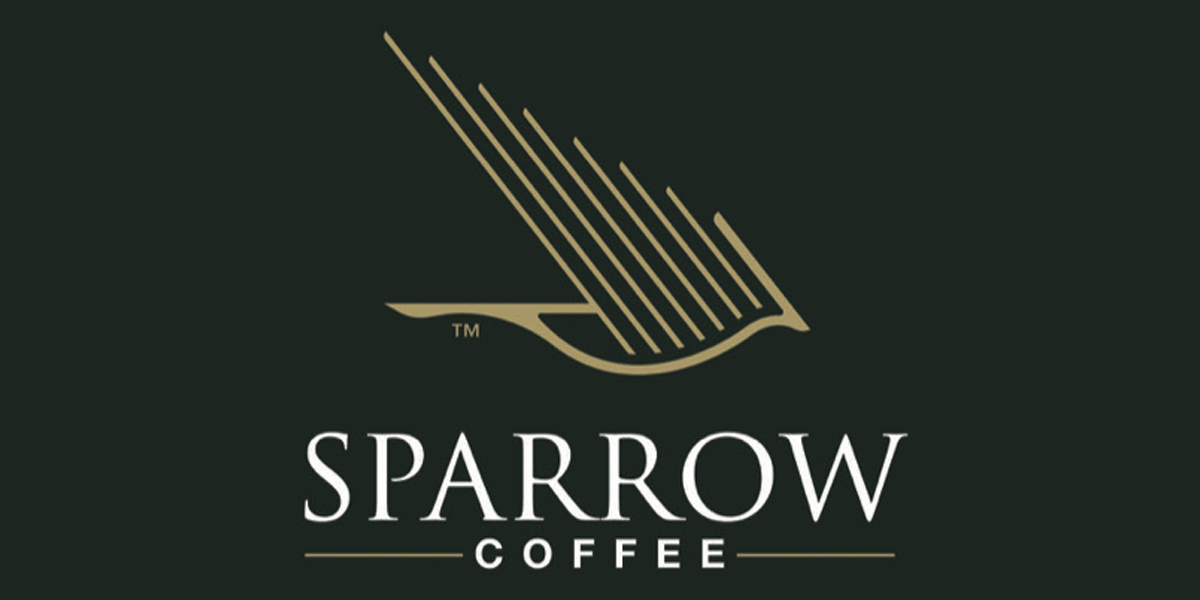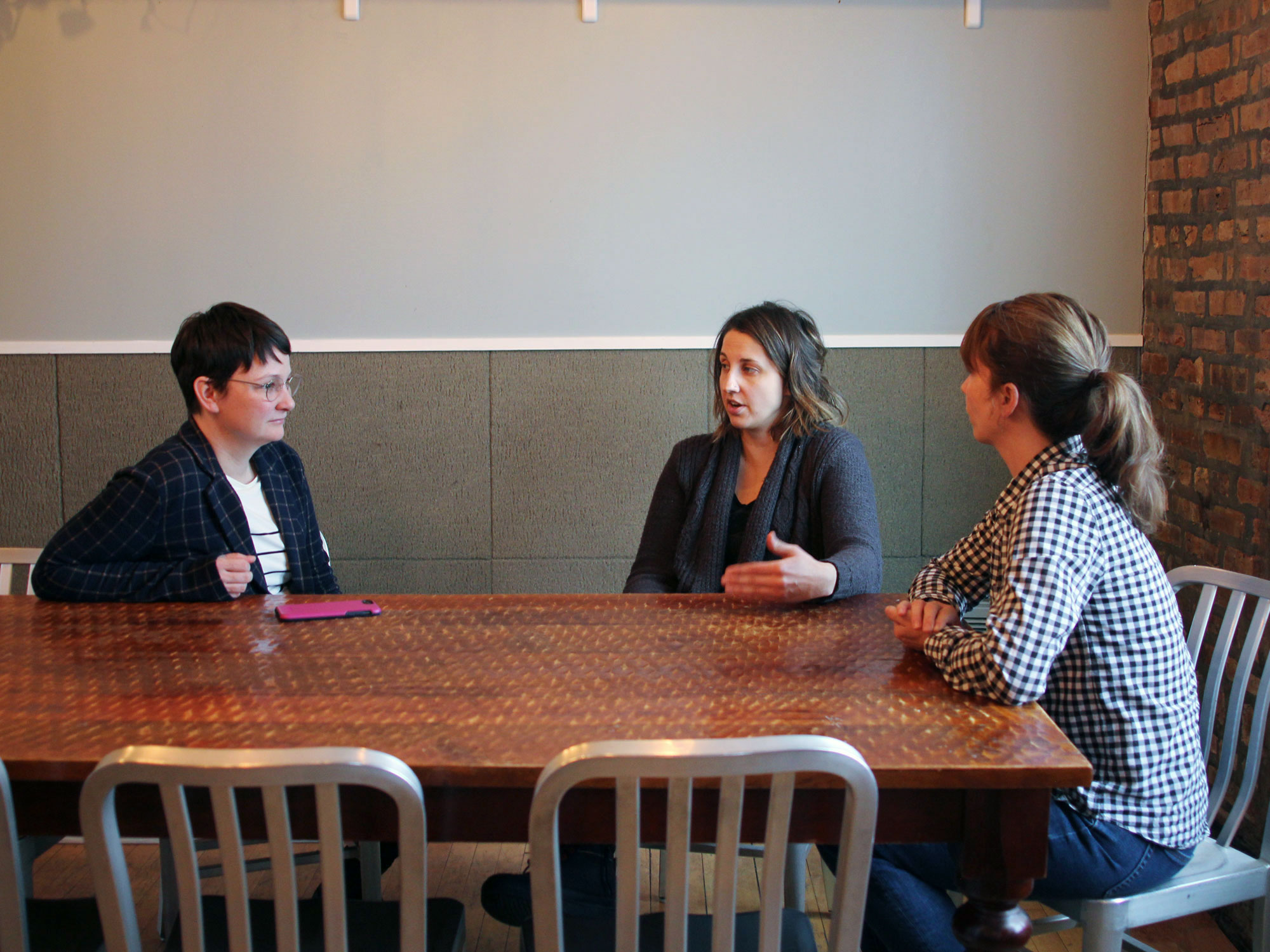THE SNOW WAS THICK AND CRUNCHY ON the streets outside Floriole in Lincoln Park, so we traded Chicago winter pleasantries as we settled in to talk, a few blocks from where the restaurant Galit will be when it opens, hopefully in March.
“I used to live in Philly, and my wife’s from Philly. I’m ready,” says chef Zach Engel.
“This is my ninth winter. Not too long, but long enough to not get too cold,” says his business partner Andrés Clavero. “It is what it is. I prefer the excess cold over the raging humidity. Which my family back home in Miami doesn’t quite understand.”
They recognize that Chicago winter is the trade-off for the other things the city offers them. “I came here two Septembers ago and just ate at a bunch of places,” Engel says. “My daughter was six months old, so it was the first time that we could travel and it wasn’t too much of a hindrance. And we were coming from a New Orleans summer, so it was like super nice here.”
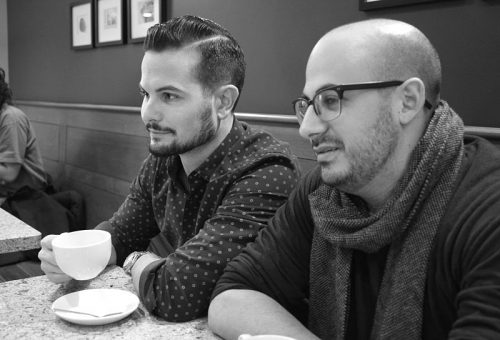
Andrés Clavero and Zach Engel
GALIT, WHICH WILL OPEN IN THE SPACE next to the alley on Lincoln north of Fullerton where John Dillinger breathed his last, will be Chicago’s first example of modern Israeli cuisine. Which is a hot trend in other cities thanks to restaurants like Alon Shaya’s Shaya in New Orleans and Michael Solomonov’s Zahav in Philadelphia, both of which Engel has worked for. In fact, the last two recipients of the James Beard Foundation Award for Rising Star Chef have come from the genre, Camille Cogswell of Zahav and… Zach Engel from Shaya.
All of which raises the question—so what exactly is “modern Israeli cuisine?” What separates what they’ll be doing from the middle eastern restaurants serving falafel and hummus in every city?
“There’s a couple different answers to that,” Engel says. “I think it’s an interesting phrase, because it’s still being defined. All of my travel experiences since I was a little kid have been to Israel. So for me, it’s understanding the immigrant cuisines that went to Israel, since really the late part of the 19th century.
“It’s about how they were isolated culturally, intermingled, intermarried, and created food businesses that were indicative of the places that they came from. Or presented their versions of Levant cuisine like falafel and shawerma—all that stuff.”
For me, part of the magic of eating in Israel is going to someone’s house, and they just cook an enormous amount of food, and it’s all sorts of stuff.
So it’s what we traditionally think of as middle eastern food? Or will it be more the food of Jews from the countries that fed into Israel? Both, Engel says. “I’ve been doing what American Jews do, cooking food from the middle east through the purview of going to Israel. Because I’ve never traveled to Lebanon or Syria or Iraq,” he says.
“We’re going to do it a little bit differently at Galit, doing dishes centered around that immigrant experience—so a classic dish from Georgia, or Tunisia, or wherever, executed with the finest ingredients in a fine dining setting with fine china. But not really doing a deconstructed interpretation of something—just, this is a really well executed version of this dish.”
I ask him what Jewish food is like coming from places, like Georgia, in central Asia. “Seasonings are very different— the herbs you’re using are really different. Where there might be more cilantro-coriander-cumin combinations in the Arabian peninsula, now you’re using nettles, the Bulgarians use chubritza which is like a wild herb that they dry, like za’atar. They’re using a lot more potatoes, and they do have more cream in their diet than a lot of the north African countries.
“While I’m cooking, I’m also reading a lot of cookbooks. I think a lot of it has to do with historical migrations through the regions. You had all these groups moving through the Ottoman Empire, and obviously the Jews have had a very interesting migratory pattern of their own. There are similar dishes and similar ingredients throughout that region, and they got there because of cultural exchange, which is always interesting to me. I think that kind of mixing is also really representative of the American culinary experience,” he notes.
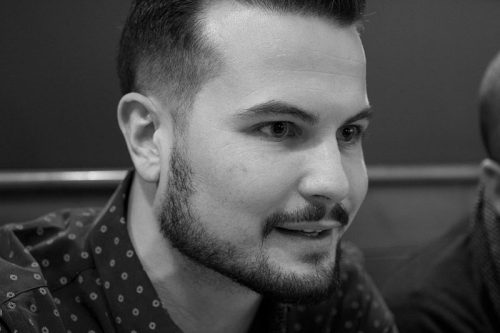
ENGEL AND CLAVERO BOTH WENT TO TULANE, which makes it sound like they’ve known each other since college. It’s not that simple—and neither is how Clavero got into the restaurant biz.
“Zach and I went to school together but we didn’t really know each other,” Clavero explains. “My love has always been food. Born and raised to Cuban grandmothers, one Spanish grandfather and the other is Palestinian.
“I was looking around for schools in great cities for food, and New Orleans, number one, without a doubt. So that’s how I got to Tulane. Then I go to look for a corporate job in big cities that have great food, not named New York—I’m kind of the classic middle child, and my older brother was already in New York, so I wanted to do something different. So I narrowed it down to Chicago and D.C.”
But a few years crunching numbers at Deloitte & Touche convinced him he had to get into food as a career. “I just started sending my resume non-stop to my favorite restaurants, mainly those of One Off Hospitality. I just found it fascinating how concepts like Big Star and Blackbird are the same owners, when they’re totally different.”
Maybe just to stop the flow of resumes, One Off’s director of operations finally asked him, what do you want to do? Clavero explains, “I said, everything that I can learn, anything that can help me open my own restaurant. Do you want to work the floor at Nico? Sure. So I started working the floor at Nico, and then they needed full time accounting as well.” He took the position, “but I did not get off the floor. I didn’t see it as working two jobs, I just saw it as what I wanted to be doing,” working both service and the back office.
That, years after he and Zach both attended Tulane, is how they finally got to know each other. Andrés went to eat at Shaya, and Zach came out from the kitchen to meet him, seeing him as an industry guy from Chicago’s One Off. Only then did they realize they’d crossed paths before. “Small world, turns out we know all the same people,” Clavero explains. “We got to work together at the James Beard Awards because of a takeover [event] at Nico, and then the next year he was back for his award.”
Engel appreciates the combination of experiences that his partner brings to Galit. “Until you get to a certain point, you’re not exposed to the numbers and the financials and trained on how to read them,” Zach says. “I didn’t know anything about that stuff until three years ago, even though I’d been cooking for seven years.”
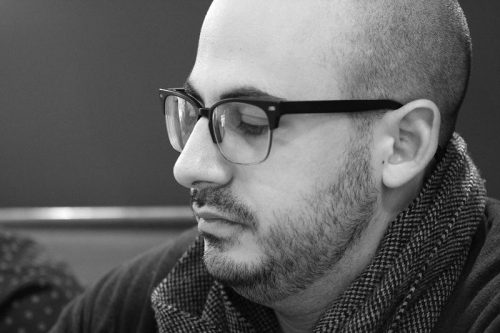
I ASK ENGEL ABOUT HIS EXPERIENCES in Israel. “When I was eight, my parents took me to Israel for the first time,” he explains. “My dad’s a rabbi, so he leads trips. My parents had lived in Israel when they were in graduate school, so they have a lot of friends there and they stay in friends’ houses. We were there for over a month, living in Israel, doing touristy stuff but not really—because you can do that in about eight days. The rest of it is hanging around.
“A little later I did Birthright, with my sister and some friends. And then when I’d been working at Zahav for a year and a half, I was like, Mike, I want to go work in Israel. Because now I’m an adult, I can pay for an apartment, I can work in a kitchen—I can explore independently. So I did that for the summer, and my girlfriend—now my wife—came over, and we traveled around, that was my backpacking experience.”
He worked at Catit, then one of the top-ranked restaurants in Tel Aviv, but he ate everything, and I ask him if that led to specific dishes.
“For sure, there’s some stuff that I like to cook that’s exactly the way someone else does it,” he says. “I lived in a house in Rishonim, which is a suburb of Tel Aviv and home to a lot of Yemenite Jews, and I learned how to make a lot of traditional Yemeni foods. So a lot of those breads, we’re going to be putting on the menu. Like, Yemenite Jews, because they’re fairly religious, they use margarine in their laminated doughs. Because they eat a meat-heavy diet, they eat a lot of stews and braises and they can’t serve butter with that.”
I ask if that works—if margarine behaves the same way in pastry as butter. “Yeah,” he says. “It’s a different taste—it’s a different lamination technique from French croissants and all that.”
His mentors, Michael Solomonov and Alon Shaya, have looked at the Israeli influence in different ways. “Alon was trying to dial into his Bulgarian-Romanian heritage,” he says. “When I was working for Mike at Zahav, years ago, he was still really getting into a lot of the basics. He was delving into the different cultures, and how they view kebabs. So there was a lot of experimentation and messing with the recipes then, and now he has his style. I would say Mike truly does modern Israeli food, where we’re trying to tell people, we’re just kind of doing middle eastern food, from my point of view, or Andrés’ heritage.”
For him, he says the real influence is less specific dishes, than an intuitive sense of how the flavors of the region go together—which makes up for not having been there recently. “If I really want to cook with celery root, say, I can build the flavors and the spices around that, and make something that’s a little less rooted traditionally than the exact dish.”
He wants to go back for a research trip, but with a two-year-old daughter—Margalit, from whom the restaurant’s name comes—it’s harder to make the trip. “I’m at a point where, I don’t like to leave my family. And if we all go, it just winds up being a slugfest of eating, and that’s hard on her.”
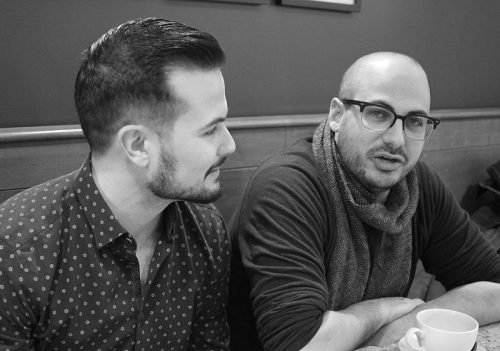
WHAT WILL DINING AT GALIT be like, I ask them?
“We definitely want to give the neighborhood something that’s a little more upscale than what’s currently there,” Andrés says. “It’s by no means white tablecloth, we want it to feel more comfortable. In terms of the feel of it, spacing and size, it’s not the largest restaurant, but it’s open kitchen, we want the diners to feel part of that experience.”
As for the food itself, I was speaking with them the night after their first and probably only practice dinner, at Boka (you can see the Instagram pictures starting here). “That was family style versions of what I’m going to be cooking,” Zach explains. “I got to do some stuff that will be on the menu initially, a little more restrained in number of ingredients, or having a ton of herbs. In my mind, what until now has always been an execution of someone else’s vision, is now what I want to bring to the table, and trying to figure out my own personal style.
“So, like falafel with four components—falafel, pickles, herbs and a sauce. That’s it. But everything together is a really great flavor combination. So nothing over the top, just really super simple and really well executed.
“There’s hummus, with a bunch of different toppings—a couple non-traditional, a couple more traditional. But the more traditional ones are a little more visually enticing—like, hummus foul is a traditional one in Israel, hummus with stewed fava beans. Normally it just looks like light brown stuff with dark brown stuff in the middle, so obviously we’re going to make it a bit more colorful than that.
“Pita in a wood fire oven, obviously we’ll be cooking some stuff over charcoal,” he says. “Everything’s going to be small plates—a good comparison is like Giant’s menu, they have a couple of little snacks, and then everything is just… a size. Nothing’s too big, nothing’s too small, so I’m not doing large plates. Everything’s easily shareable. It’s all family style, and we’ll be doing a prix fixe menu, where you can just sit back and all the decisions have been made for you.
“For me, part of the magic of eating in Israel is going to someone’s house, and they just cook an enormous amount of food, and it’s all sorts of stuff. I have a friend who’s Belgian, Moroccan and Russian. So there’s Russian potato salad, and Russian sausages, dry-cured, and tagine and couscous, and lots of aioli on stuff. And that was his shabbat dinner table that he invited me to, and everyone just kind of digs in.
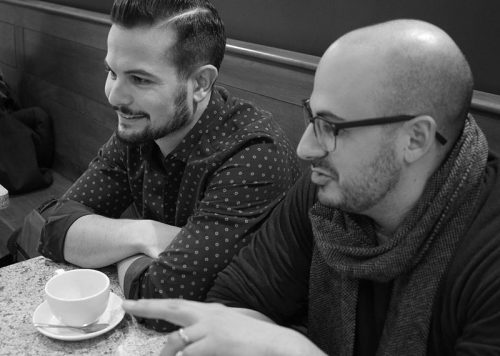
They’re aiming for a pretty accessible price point, they tell me, but it will be more expensive than your local pita joint. I ask what they see as justifying that price point. “It has a lot to do with, are you sourcing the best ingredients,” Zach says. “That’s a lot of what I’m working on right now, I’m new to Chicago, I don’t have vendors that I’ve worked with for years that I know and trust. I’ve got people that have recommended me vendors, but I have to go through a process. Because a butternut squash in New Orleans is different from one in California is different from Chicago, and they’re available at different times.
“This is something that we talked about a lot when we opened up Shaya. It has to be the best version that anyone’s ever had. If I’m making falafel, the falafel has to blow that guest away when they eat it. Not once, not twice, but every single time they come in that door. I’ve always focused on consistency in level of food quality, and presentation. And that’s how you can charge prices.
“You’re paying for me to get chickpeas from Rancho Gordo, who don’t do wholesale through a distributor, and I’m getting hundreds of pounds of chickpeas a week from them. And for the amount of technique that goes into making the hummus. I could put it in a food processor, and not try very hard, and it’d be okay, but that hummus recipe is the best hummus you’ll ever have in your life.
“That said, as much as there’s giving guests an experience that’s a cut above a lot of middle eastern restaurants that everyone knows, it’s also supposed to feel tuned in to how the food is normally eaten,” he says. “I’m not trying to do a tasting menu. I mean, no one wants a tasting portion of hummus.”
“With one pita chip,” Andrés adds.
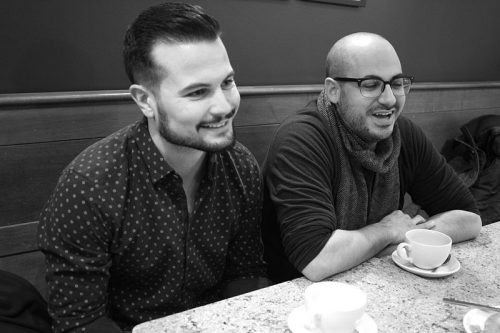
AS WE’RE SITTING THERE AT FLORIOLE, owner Sandra Holl comes by and introduces herself. (I had just spent a couple of hours with her for Fooditor’s industry round table.) A few minutes later one of the women behind the counter brings us a plate of cookies.
That brings us to the reception they’ve enjoyed in Chicago since announcing their plans here. “Everyone’s been so friendly,” Zach says. “Jason and Ben at Giant—they said, you ever need a kitchen to work in, we’re closed Sunday and Monday, you can use ours. Well, you know, we just might need one for this dinner at Boka…”
The previous night’s event at Boka was the most interaction they’ve had with a Chicago restaurant. “Yesterday was a big day for the realization of our plans,” Andrés says.
“It was good for me, because I got to cook again. It’s been a long time,” Zach says. “I would cook like a couple of days and show people how to do it. Just make sure they were good. I’d run through it once, check in with you on your second time, third time just double check your final product, but I couldn’t be there every day to cook for them.
“I haven’t really cooked in a long time. I’m actually more excited about that, to get back into a place where I’m running a kitchen and cooking every day. That’s what I got into this for.”
Andrés says, “I was in a meeting, and I called Zach and he was off the grid, he didn’t answer—he claimed bad service—”
“I was in the basement.”
“I know he was so excited to be prepping for this event. Because I know he’s been dying to cook for this meal.”
“I cook at home,” Zach says, “but when I cook at home, it’s just, whatever. I’m not trying to julienne stuff, unless it’s to make it easier for my daughter to eat. So I was like, the muscle memory’s there, get the shakes out, still got it.”
“That was the coolest thing for me,” Andrés says. “We’re looking at preshift [meeting], and this is the first time we’re telling our story. I worked at Nico, he worked at this or that, but this is our story, and we’re telling the servers what it is. That was cool.”
WE’RE LEAVING FLORIOLE TO GO BACK out into the gray winter afternoon. They have a meeting not too far away, so I offer them a ride.
“That’s okay, we’re good,” Zach says. “I like taking public transportation. It helps me get to know the city. It’s nice to be in a city where you can do that.” And so off they go, crunching across the snow, like true Chicagoans.
Michael Gebert is chief macher of Fooditor.
Latest
Join the Discussion
After you comment, click Post. If you're not already logged in you will be asked to log in or register with Disqus.




